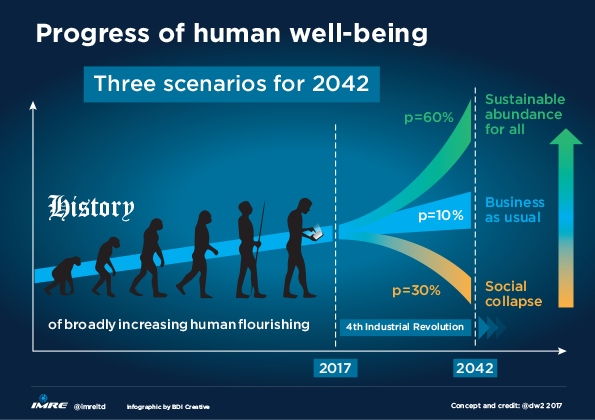The Future is Dystopian or Bright?posted Nov 19, 2017, 5:09 AM by Paul Imre https://sites.google.com/a/imreltd.co.uk/unconference-ai-gx/project-updates/thefutureisdystopianorbright
The future is one of many possibilities and these possibilities range greatly in scope and outcome. The changes in technology that are predicted to occur over the next 30 years could have a profound effect on the way work is performed, food production, and the environment. However, as with all periods of great advancement that have occurred in human history, there are many possible outcomes. For purposes of simplicity, these can be divided into positive outcomes, negative outcomes, or neutral outcomes. Here is what each outcome could possibly look like. Probability 60% Abundance And Hope The greatest possible outcome is the improvement of the human condition. Historically human civilization has trended upward with lifespans increasing, education improving, greater freedoms, personal earnings increasing, and deaths due to widespread violence decreasing. Now, this is not to say civilization’s advancements haven’t had periods of difficulty, war, strife, and the occasional setbacks but taken as a whole things tend to get better in ways that can be hard to see in the moment. The next several decades are certainly ones with great potential. Advancements in fields such as artificial intelligence, automation, and the medical fields have the potential to have profound effects on not only how we work and live but also on how long we live and the level of comfort in which we live. Solving highly important issues such as world hunger are a possibility and looking to past achievements (such as the elimination of certain diseases) there are signs that such things are achievable again in the future. Probability 30% Dystopia And Societal Collapse Not all thoughts about the future are hopeful ones. Looking through human history even very powerful civilizations have fallen (Western Rome and the Achaemenid Empire are two such historical examples). No matter where or when the key factors that cause civilizational decline are various types of common ‘stress events’ related to the economy, rule of law, strength of the government, wartime concerns, population density, and so on. Not everyone views technological advancements as beneficial and see several ways they could have a negative impact on society. Common examples include automation decreasing the availability of work without anything to fill this new employment gap, governments using technology to spy on or control their citizens, technology driving wealth inequality to levels that destroy societal bonds, and the always popular AI takeover which has been around for a very long time but is increasingly popular due to AI advancing as a field of study. Certainly, scepticism is healthy and bad outcomes are certainly possible. However, by being aware of these possibilities preventative measures can be taken to prevent them from occurring or limiting their impact when avoidance is not realistically possible. Probability 10% Business As Usual The last of the three possible outcomes is also the least dynamic. Things go on much like they always have with the same highs, lows, successes, failures, problems, and solutions. The idea being that the issues humanity faces now will endure despite technological advances and that issues such as famine and disease will find new ways to trouble us. While not impossible the idea is flawed in its very premise hence its low probability. It relies on the end of history concept in that humanity endures but nothing changes because we’ve reached an endpoint in the development of the systems that guide human civilizations. History to this point shows humans tend not to operate in this way and continually try to innovate and experiment with things with many people driven by this need to innovate. Final Thoughts With the sheer number of variables that will affect what the future brings predicting with 100 percent undeniable certainty what will happen is an impossibility. Anyone saying they unequivocally know the exact outcome of future events is either lying, sure of themselves to an unhealthy degree or trying to sell you something. In the end, technology will advance and new breakthroughs will be made. How these discoveries are used depends on input from people from several different walks of life and in several different professions both public and private. The possibilities for both a better future and dystopia are there but through careful judgment and a pragmatic future-minded worldview, the odds favour humanities continued advancement. |

